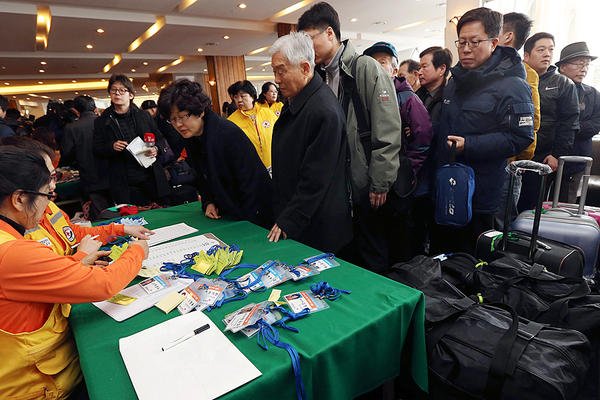
North Korea is holding family reunions for more than 100 South Koreans who have arrived in the country to meet their relatives – the first such events since 2010.
The reunions, which come after North Korea called for better relations between the two sides, are taking place from February 20 to 25.
They are held for families separated after the Korean War. The relatives have not seen each other for decades.
They come ahead of planned US-South Korea drills, which begin on Monday.
North Korea had earlier threatened to cancel the reunions if the military exercises went ahead.
On Thursday, 82 elderly South Koreans, accompanied by 58 family members, left for North Korea by bus.
More than a dozen of them were in wheelchairs, and two travelled in ambulances as they needed medical attention, AFP news agency reported.
They carried gifts, including clothing, medicines and food for their relatives.

They were scheduled to meet their North Korea relatives in the North’s Mount Kumgang resort at 15:00 local time, followed by dinner together.
Around 180 North Koreans were expected to attend the reunion.
One of those selected for the reunions was South Korean Lee Du-young, who is in his late 70s.
He said that as well as warm clothing, he would buy his brother chocolate biscuits because he heard they were sought-after treats in North Korea.
South Korea’s unification ministry said on Wednesday: “Currently, it does not appear that there will be any hindrance to the reunion event.”
The reunions are highly emotional occasions. Families from both sides meet briefly at the events, before returning to their respective homes.
Only 100 or so relatives are chosen to take part each time, and North Korea has in the past cancelled the reunions after South Korea took actions it opposed.
The South Koreans relatives were briefed before the reunions and were told not to talk about politics.
Many people were separated from their relatives by the division of the Korean peninsula after the 1950-1953 war.
The Korean War ended in a ceasefire, not a peace treaty, and there are no direct means of communication for most North and South Koreans.
About 72,000 South Koreans are on a waiting list to join the family reunion events. Nearly half of them are over 80.
The reunions are the only legal way for families separated by the division of the country to see each other.
[youtube y6t99MM-Rj0 650]